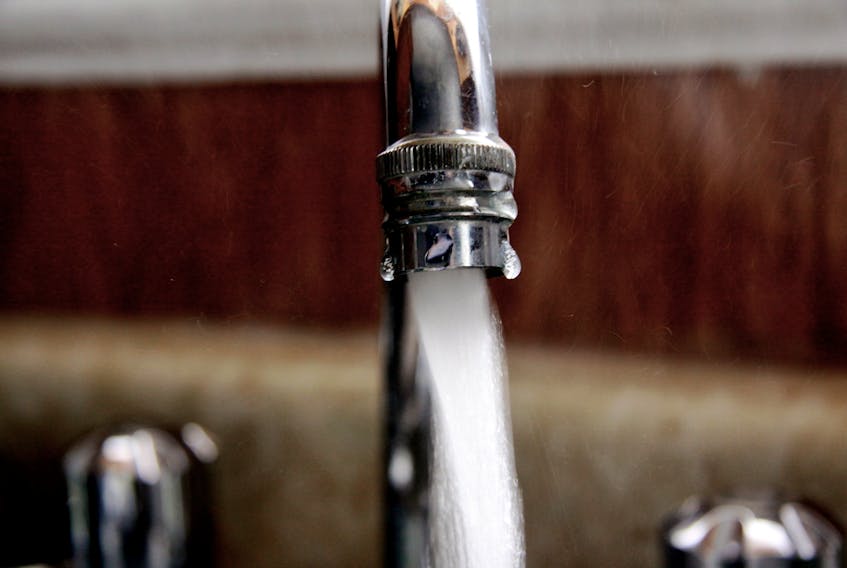GREENWOOD – A Greenwood woman said she was shocked this summer when she found out she, her husband and their children may have been drinking water contaminated with a probable carcinogen for the past five years.
Dawn Baillie received a letter and package of material from the Department of Environment in July telling her that testing on her well water showed levels of tetrachloroethylene that were above the minimum standards.
Also known as perchloroethylene, or PCE, the chemical is believed to have entered the groundwater in Greenwood after a 1995 fire at a dry-cleaning business on Central Avenue. There may also have been improper disposal of waste water from the business in the years prior to that.
The material she received said that two water samples in December 2017 showed levels of 23.2 and 18.94 micrograms per litre, and a follow up sample in February showed a level of 27.5.
Federal guidelines set the acceptable level at 10 micrograms per litre.
Baillie’s family bought the house when they moved to Greenwood in 2013. Since then they’ve been using their well water to drink, cook and shower.
Baillie said there was nothing in the property disclosure form when she and her husband purchased their two-storey home that said the well had tested positive for PCE or that there had been groundwater contamination in the area. But her package of material from the Environment Department said the well had tested positive, albeit under the allowable limit, in 2003 or 2004. That information would have been passed on to the homeowner at the time, she said.
Realtor property disclosure forms only ask about problems with the quality or quantity of water, and if the known test results are within the acceptable limits they don’t technically have to be disclosed, a veteran realtor said.
The agent didn’t want to be identified, but said they personally suggest to clients that they disclose any issues regardless of the levels.
Baillie said she took a water sample during the purchase process to Valley Regional Hospital to be tested. But the basic test doesn’t look for PCE.
“We’ve found out now that you’d have to have that tested specially and ask for a test for that chemical,” she said.
“We never doubted (the test), we just thought the water was good.”
The family was moving to Greenwood from Halifax, Baillie said, and had no knowledge of the history of contamination in the Greenwood area, the fire, or the fact that the County of Kings would finance them to hook into the municipal water system.
“We didn’t know anyone in the area we moved into, so I’m kind of regretting now not talking to the neighbours.”
Her home is on a street that is within a designated “area of interest” in a 2005 environmental site assessment prepared for the provincial Department of Transportation and Public Works. A map showing that area was included in her package from the Environment Department.
In a July letter to the Municipality of Kings County, the Environment Department said it tested the well water at 33 homes, with six of those having results above the acceptable level.
Baillie said she fears that with Greenwood being a military community and people moving in and out frequently, other people may have been exposed to the chemical after buying a home and not know.
The family has spent more than $5,000 to hook into the municipal water system, which was completed Aug. 23.
“We did it as quick as possible because we have children,” she said. “We’re scared and didn’t want to be drinking that anymore.”
The Environment Department says that, for most people, the potential health risks occur over long periods of time. PCE is a probable carcinogen, and ingesting high levels of the chemical can cause liver, kidney and nervous system damage.
Boiling the water does not remove the chemicals, and the chemical can also enter the body when vapours are inhaled when bathing, showering, and washing dishes by hand.
“My big concern is with my children, and five years of growing and drinking water. We used it daily because I never questioned it. I thought our well water was fantastic,” Baillie said.
The municipality extended its water utility to the area in 2005, but hooking up was voluntary and not all homeowners opted to do so.
Baillie said she has spoken to a lawyer about the situation.
“We’re in that process right now,” she said.
She said whether the real estate agents involved in the transaction knew about the 2003 test results that showed PCE, she would have thought they would have known about the area and the history of contamination and passed on that information.
“Moving forward, I hope they put something in place so this doesn’t happen to other people,” she said. “You should be able to buy a home and know that your water is safe to drink.”
While the water was likely contaminated in the fire or before, the contamination problem wasn’t discovered until August 2004, during unrelated follow up work by a consultant into a 2001 fuel spill at a car wash in the area.
The initial 2001 report noted the presence of PCE in tests, but no one noticed that information until the follow-up report and testing because the focus was on results related to the fuel.









